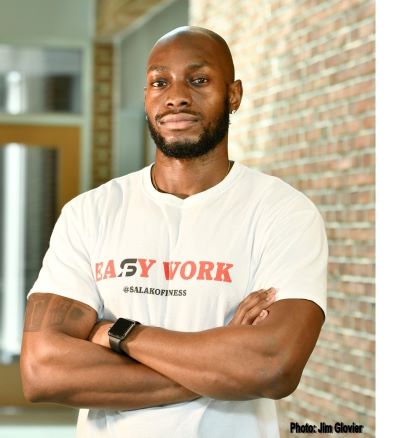
UMES physical therapy student achieves U.S. citizenship
Monday, March 1, 2021
Jan. 6, 2021 will go down in American history as the day democracy faced one of its stiffest challenges when citizens angry about 2020’s presidential election results stormed the Capitol.
Akanni Salako, a third-year student in UMES’ physical therapy program, was ineligible to vote for president this past November, but earned that right Jan. 5 — the day he took and passed the U.S. Citizenship and Immigration Services’ civics test.
A two decade-plus journey was over.
“It felt like I could start my life,” he said.
Salako, 28, emigrated from Nigeria with his parents when he was four.
“The average person who met me didn’t know I’m an immigrant,” he said.
He grew up in the suburbs of Bowie, Md. in Prince George’s County.
“There were a lot of things I couldn’t do,” he said. “Like driving. I didn’t have the proper paperwork. In the back of my mind, it always felt like there was something looming over my head.”
After graduating from Bowie High School, Salako attended Chesapeake Community College in Wye Mills, Md., where he played basketball and earned an associate’s degree. From there, he enrolled at Virginia Union University in Richmond, majoring in biology and earning a scholarship to play basketball, where at 6-3 he played guard.
Salako immersed himself in life at a private, historically black institution, joining Kappa Alpha Psi Fraternity Inc., serving on the university’s “royal court” and holding the title of Mister 1865. He also earned induction into the National Scientific Honor Society.
He graduated from Virginia Union in 2016 and took a year off — unsure what he wanted to do next. During that year, he became a certified personal trainer and started his own business, Salako Fitness.

He also turned his attention to studying for the Graduate Record Examination and finding the best fit for his desire to parlay his interest in fitness into a career.
UMES emerged as his choice because it “is a good value … and there’s more of a clinical application to what we’re learning.”
During his interview to gain admission, Salako impressed Dr. Michelle Sanfilippo, an assistant professor who serves as UMES’ clinical education director, with “his infectious smile, mature demeanor – and distinct height.”
In the back of Salako’s mind was the Obama administration’s executive order that created the Deferred Action for Childhood Arrivals immigration policy. “It changed my life and started the transition to becoming a citizen,” he said.
He said he has encountered those who believe immigrants “make trouble, steal our jobs. They’re just trying to find a livelihood – trying to make something of themselves.”
As he studied to pass the citizenship test this past fall, he kept reminding himself that “being an immigrant … doesn’t make me any less important. I have things I can contribute if given the opportunity.”
“There are a lot of questions you know the average American doesn’t know,” he said. “I studied for three days; it was easy. The way I study, I have a method down.”
Try your hand at the U.S. Citizenship test HERE
Salako’s clinical rotations have included a stint at an acute care hospital, where he worked with patients who had orthopedic and neurological challenges as well as those who suffered strokes and traumatic brain injuries.
“He has been an excellent addition to our program,” Sanfilippo said, adding that he “is the student who constantly assisted classmates when they needed assistance with hands-on content in the acute care course during the 2019 summer semester.”
Classmate Evann Slaughter said, “he’s always there if you need him, but also works so hard for his business. It’s a wonder how he manages to fit everything in.”
“He never fails to give anyone in need a helping hand — without hesitation — while still managing his health, academics and his business,” classmate Kylie Archibald said.
Long-term, Salako’s goal is to be a self-employed physical therapist, combining the training he’s received as a UMES graduate student with what he’s learned being a personal trainer.
He called his first semester at UMES a more academically intense experience than “everything I learned as an undergraduate.”
“I was challenged,” Salako said, “but I feel I’m prepared” to graduate in September.
“Now, there’s nothing that can stop what I’m trying do now,” he said.

